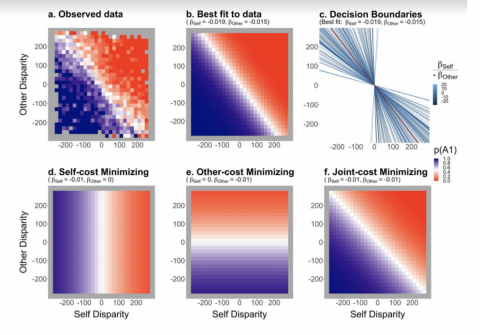Computing Joint Action Costs: Co-Actors Minimize the Aggregate Individual Costs in an Action Sequence

Georgina Török, Oana Stanciu, Natalie Sebanz & Gergely Csibra
Successful performance in cooperative activities relies on efficient task distribution between co-actors. Previous research found that people often forgo individual efficiency in favor of co-efficiency (i.e., joint-cost minimization) when planning a joint action. The present study investigated the cost computations underlying co-efficient decisions. We report a series of experiments that tested the hypothesis that people compute the joint costs of a cooperative action sequence by summing the individual action costs of their co-actor and themselves. We independently manipulated the parameters quantifying individual and joint action costs and tested their effects on decision making by fitting and comparing Bayesian logistic regression models. Our hypothesis was confirmed: people weighed their own and their partner’s costs similarly to estimate the joint action costs as the sum of the two individual parameters. Participants minimized the aggregate cost to ensure co-efficiency. The results provide empirical support for behavioral economics and computational approaches that formalize cooperation as joint utility maximization based on a weighted sum of individual action costs.